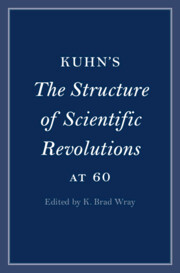Book contents
- Kuhn’s The Structure of Scientific Revolutions at 60
- Cambridge Philosophical Anniversaries
- Kuhn’s The Structure of Scientific Revolutions at 60
- Copyright page
- Dedication
- Contents
- Figures
- Tables
- Contributors
- Acknowledgments
- Abbreviations
- Introduction
- Part I Writing Structure
- Part II Normal Science and Science Education
- Part III Incommensurability, Progress, and Revolutions
- Part IV Kuhn’s Impact on the Philosophy, Sociology, and History of Science
- 12 The Ambiguous Legacy of Kuhn’s Structure for Normative Philosophy of Science
- 13 Thomas Kuhn and the Strong Programme
- 14 Kuhn and the History of Science
- Bibliography
- Index
14 - Kuhn and the History of Science
from Part IV - Kuhn’s Impact on the Philosophy, Sociology, and History of Science
Published online by Cambridge University Press: 05 January 2024
- Kuhn’s The Structure of Scientific Revolutions at 60
- Cambridge Philosophical Anniversaries
- Kuhn’s The Structure of Scientific Revolutions at 60
- Copyright page
- Dedication
- Contents
- Figures
- Tables
- Contributors
- Acknowledgments
- Abbreviations
- Introduction
- Part I Writing Structure
- Part II Normal Science and Science Education
- Part III Incommensurability, Progress, and Revolutions
- Part IV Kuhn’s Impact on the Philosophy, Sociology, and History of Science
- 12 The Ambiguous Legacy of Kuhn’s Structure for Normative Philosophy of Science
- 13 Thomas Kuhn and the Strong Programme
- 14 Kuhn and the History of Science
- Bibliography
- Index
Summary
This chapter first discusses the use of history in Kuhn’s The Structure of Scientific Revolutions, arguing that he does not offer a grand historical narrative, does not practice integrated history and philosophy of science, and does not use historical examples as evidence for his philosophical model. The chapter then sketches an alternative account that draws on Wittgenstein’s concept of object of comparison, that is, a yardstick that is laid against reality to illuminate certain of its features. It then compares Kuhn’s model of science to Wittgenstein’s language games and claims that both, as objects of comparison, undermine an essentialist understanding of science and language, respectively. The chapter concludes by presenting the various ways Kuhn’s work has impacted the historiography of science.
Keywords
- Type
- Chapter
- Information
- Kuhn's The Structure of Scientific Revolutions at 60 , pp. 254 - 274Publisher: Cambridge University PressPrint publication year: 2024

